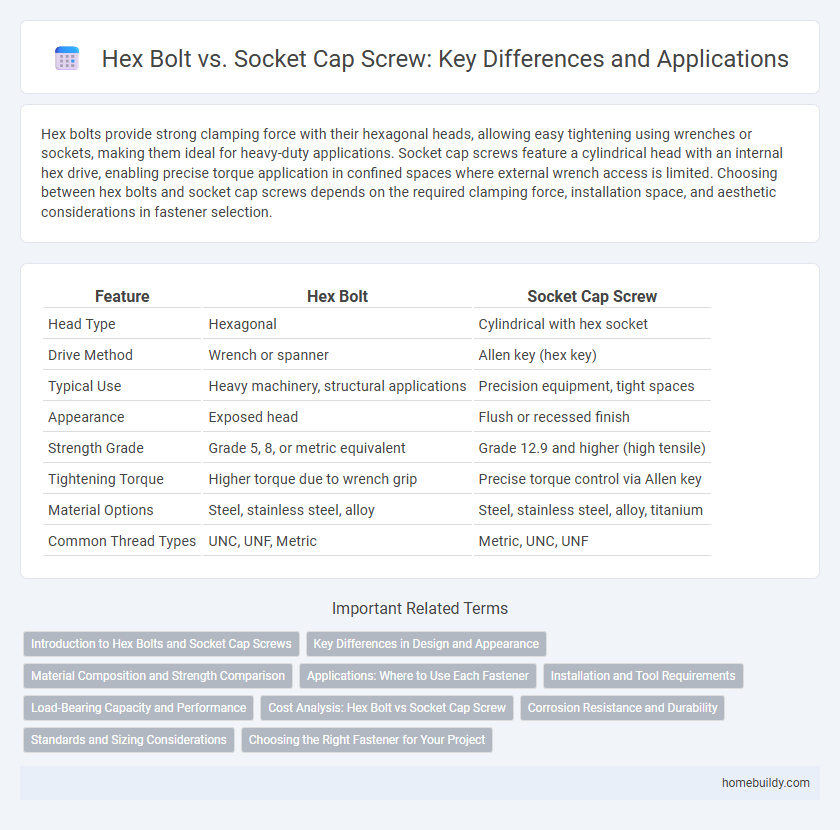Hex bolts provide strong clamping force with their hexagonal heads, allowing easy tightening using wrenches or sockets, making them ideal for heavy-duty applications. Socket cap screws feature a cylindrical head with an internal hex drive, enabling precise torque application in confined spaces where external wrench access is limited. Choosing between hex bolts and socket cap screws depends on the required clamping force, installation space, and aesthetic considerations in fastener selection.
Table of Comparison
| Feature | Hex Bolt | Socket Cap Screw |
|---|---|---|
| Head Type | Hexagonal | Cylindrical with hex socket |
| Drive Method | Wrench or spanner | Allen key (hex key) |
| Typical Use | Heavy machinery, structural applications | Precision equipment, tight spaces |
| Appearance | Exposed head | Flush or recessed finish |
| Strength Grade | Grade 5, 8, or metric equivalent | Grade 12.9 and higher (high tensile) |
| Tightening Torque | Higher torque due to wrench grip | Precise torque control via Allen key |
| Material Options | Steel, stainless steel, alloy | Steel, stainless steel, alloy, titanium |
| Common Thread Types | UNC, UNF, Metric | Metric, UNC, UNF |
Introduction to Hex Bolts and Socket Cap Screws
Hex bolts feature a six-sided head designed for wrench tightening, commonly used in construction and machinery for heavy-duty fastening. Socket cap screws have a cylindrical head with an internal hex drive, offering a sleek appearance and high torque capability in confined spaces. Both fasteners provide strong, reliable connections but differ in head design and application suitability.
Key Differences in Design and Appearance
Hex bolts feature a hexagonal head designed for use with a wrench or socket, providing greater torque and ease of installation in construction and machinery applications. Socket cap screws have a cylindrical head with a recessed hex drive, offering a sleek, flush finish ideal for precision engineering and applications requiring a clean appearance. The distinct head shapes and driving mechanisms make hex bolts suitable for heavy-duty fastening, while socket cap screws excel in tight or recessed spaces where aesthetics and compact design are essential.
Material Composition and Strength Comparison
Hex bolts are commonly made from carbon steel, stainless steel, or alloy steel, offering high tensile strength and durability suited for heavy-duty applications. Socket cap screws typically use alloy steel or stainless steel with precise heat treatment, resulting in superior tensile strength and hardness compared to standard hex bolts. The material composition of socket cap screws often provides enhanced resistance to wear and corrosion, making them ideal for high-stress environments requiring precise fastening.
Applications: Where to Use Each Fastener
Hex bolts are ideal for heavy-duty construction and machinery applications requiring strong, secure fastening with wrench access, often used in steel fabrication and wood construction. Socket cap screws, favored in precision engineering and automotive assemblies, provide high tensile strength with a clean, recessed hex drive, making them suitable for tight spaces and machine parts needing flush surfaces. Selecting between these fasteners depends on accessibility, load requirements, and the need for a sleek finish in the final assembly.
Installation and Tool Requirements
Hex bolts require a wrench or socket for installation, offering ease of use in applications with accessible bolt heads. Socket cap screws demand an Allen key or hex wrench, providing a flush finish ideal for tight spaces and recessed fittings. The choice depends on tool availability and the need for a clean, compact installation.
Load-Bearing Capacity and Performance
Hex bolts feature a larger bearing surface with flat washers that distribute loads effectively, making them suitable for heavy-duty load-bearing applications requiring high tensile strength. Socket cap screws, designed with a cylindrical head and internal hex drive, offer precise performance in tight spaces but generally support lower load capacities compared to hex bolts. The choice between hex bolt and socket cap screw depends on application requirements for load distribution, assembly precision, and material stress tolerance.
Cost Analysis: Hex Bolt vs Socket Cap Screw
Hex bolts typically offer a lower cost compared to socket cap screws due to simpler manufacturing processes and widespread availability. Socket cap screws, made with high-grade materials and precision machining, tend to be more expensive but provide superior strength and a cleaner finish. Choosing between the two depends on budget constraints and required performance levels in industrial applications.
Corrosion Resistance and Durability
Hex bolts typically feature a thicker shank and are often made from carbon steel with various coatings like zinc or galvanization to enhance corrosion resistance, making them ideal for outdoor applications. Socket cap screws, usually manufactured from stainless steel or alloy steel, offer superior corrosion resistance and exceptional durability in high-stress environments due to their precise manufacturing standards. Choosing between the two depends on the specific exposure conditions and mechanical load requirements, with socket cap screws being preferable for harsher, more corrosive settings.
Standards and Sizing Considerations
Hex bolts and socket cap screws differ primarily in standards and sizing specifications, with hex bolts commonly adhering to ASTM A325 or ISO 4017 standards, while socket cap screws often follow ISO 4762 or DIN 912. Hex bolts feature a larger head size for wrenching and are sized based on nominal diameter and length from under the head, whereas socket cap screws have cylindrical heads with an internal hex drive and are measured from the bottom of the head to the end of the screw. Proper selection relies on understanding these distinctions to ensure compatibility with industry requirements and mechanical applications.
Choosing the Right Fastener for Your Project
Hex bolts offer high tensile strength and are ideal for heavy-duty construction and machinery applications, featuring a hexagonal head for easy wrench use. Socket cap screws provide a sleek appearance and precise fit in machinery and electronics, using an internal hex drive for tight torque control. Selecting the right fastener depends on load requirements, space constraints, and the needed aesthetic or functional properties, ensuring optimal performance and durability in your project.
Hex Bolt vs Socket Cap Screw Infographic

 homebuildy.com
homebuildy.com